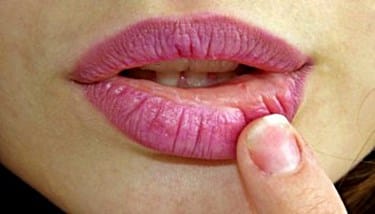Cold sores may not last for that long, but they hurt and can be embarrassing. They become more noticeable when they start to blister and burst. More often than not, this is also the time when they become inflamed. That’s why it helps to know some effective ways to reduce cold sore inflammation.
The inflammation of a cold sore is like swelling anywhere else on the face or body. The main difference is that it’s caused by a virus so that it can be spread or passed on to other people. The good news is that there are ways to minimize cold sore swelling without spreading the HSV-1 virus.
The symptoms may lead to you touching or picking at the scab, which can result in further bleeding and scabs. It can be a never-ending cycle, without the appropriate medical care and attention.
Let’s take a look at some of the best ways to soothe a swollen cold sore at home. These treatment options are also intended to reduce pain. That way, your cold sore can continue to heal, and you won’t have to deal with the constant discomfort for up to 2 weeks.
5 Best Ways to Heal an Inflamed Cold Sore
Treatments range from FDA-approved prescription medications to natural home remedies with just anecdotal proof that they work. Let’s explore the different ways to treat inflamed cold sores:
Use Abreva® Cold Sore Cream
You probably realize that Abreva® is the most popular over-the-counter cream for cold sores. Here are some of the benefits of the formula and reasons why it’s so widely used:
- Reduces cold sore pain.
- Prevents cold sores from spreading by blocking the cells from traveling.
- Works as a moisture barrier to keep the blister from cracking further.
- Healing time is dramatically reduced *.
- Approved by the FDA in July 2000.
* Laboratory studies have found that the average healing time was reduced to 4.1 days. A quarter of sufferers were free from cold sores in just 2.5 days.
For best results, apply Abreva® cream when you experience a tingling sensation around the mouth. The sooner you take action, the less likely that a cold sore will become inflamed.
Apply a Cold Compress
Inflammation comes with a burning and itching sensation. You can reduce this by placing a cold compress onto the area for about twenty minutes. Not only will the cold temperature help to reduce the swelling, but it will also provide some welcome relief from the pain.
If you’re experiencing pain, apply an ice cube directly to the cold sore. It will numb the area and offer some short-term relief until the swelling starts to go down on its own.
Reduce Inflammation with Tea Tree Oil
If you’re looking for a natural treatment for reducing inflammation, try applying tea tree oil. It has anti-inflammatory and antiviral properties. Mix it with coconut oil so that it doesn’t sting as much. Apply it to the cold sore, and you can expect faster healing.
The anti-inflammatory properties can also help to reduce the size of any swelling significantly. You’ll be able to save yourself from the embarrassment that often comes with a swollen fever blister. But check how your body responds to the formula and adjust the strength accordingly.
Soothe Cold Sores with Aloe Vera
This is another natural solution that reduces inflammation. Not only does it have anti-inflammatory properties, but it will also lock in moisture and reduce redness around the cold sore.
To apply it, you can either extract the juice from an aloe vera plant or buy an organic aloe vera gel. Simply dab the aloe vera on the affected area gently, as often as needed, for some light relief.
OTC Anti-Inflammatory Medications
Over-the-counter medications, like Ibuprofen or aspirin, have anti-inflammatory properties. They will also help to reduce swelling. If the blister has started to cause pain, take one of these meds. The advantage is that most people already have at least one of these medications at home.

How to Reduce Cold Sore Inflammation
Cold sores go through several stages. The pain and inflammation normally occur after the blister has erupted and started to scab over.
There are signs you can look for early on that may let you know a cold sore is on its way. For example, one of the first symptoms is an itching sensation or tingling around the mouth. You’ll also be able to recognize the triggers, such as stress, sunlight, pregnancy, and cold weather.
Once the blister appears, take preventative measures with Abreva, HERP-B-GONE, or another top-rated topical cold sore gel. Additionally, petroleum jelly can keep the sore moist.
How to Prevent Cold Sores Completely
Cold sores are a symptom of the HSV-1 virus. If you’ve contracted that virus, it will be stored in your body forever. It is a dormant virus that is activated by common triggers.
However, flare-ups do occur in the form of fever blisters. To avoid a flare-up, steer clear of anyone who has a cold sore, making sure to wash your hands regularly.